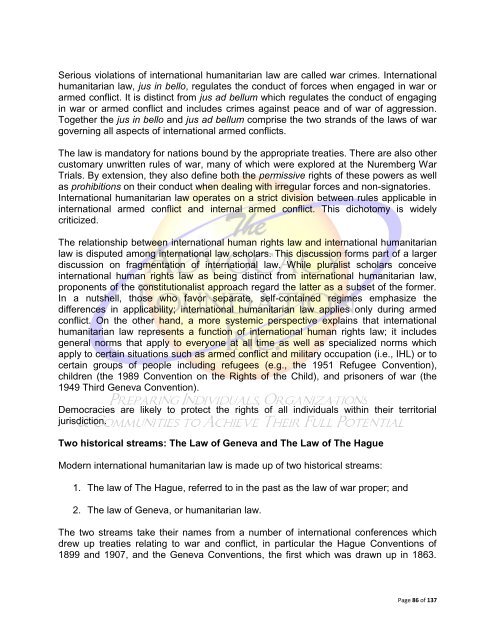The Theology of Missions
The Theology of Missions
The Theology of Missions
Create successful ePaper yourself
Turn your PDF publications into a flip-book with our unique Google optimized e-Paper software.
Serious violations <strong>of</strong> international humanitarian law are called war crimes. International<br />
humanitarian law, jus in bello, regulates the conduct <strong>of</strong> forces when engaged in war or<br />
armed conflict. It is distinct from jus ad bellum which regulates the conduct <strong>of</strong> engaging<br />
in war or armed conflict and includes crimes against peace and <strong>of</strong> war <strong>of</strong> aggression.<br />
Together the jus in bello and jus ad bellum comprise the two strands <strong>of</strong> the laws <strong>of</strong> war<br />
governing all aspects <strong>of</strong> international armed conflicts.<br />
<strong>The</strong> law is mandatory for nations bound by the appropriate treaties. <strong>The</strong>re are also other<br />
customary unwritten rules <strong>of</strong> war, many <strong>of</strong> which were explored at the Nuremberg War<br />
Trials. By extension, they also define both the permissive rights <strong>of</strong> these powers as well<br />
as prohibitions on their conduct when dealing with irregular forces and non-signatories.<br />
International humanitarian law operates on a strict division between rules applicable in<br />
international armed conflict and internal armed conflict. This dichotomy is widely<br />
criticized.<br />
<strong>The</strong> relationship between international human rights law and international humanitarian<br />
law is disputed among international law scholars. This discussion forms part <strong>of</strong> a larger<br />
discussion on fragmentation <strong>of</strong> international law. While pluralist scholars conceive<br />
international human rights law as being distinct from international humanitarian law,<br />
proponents <strong>of</strong> the constitutionalist approach regard the latter as a subset <strong>of</strong> the former.<br />
In a nutshell, those who favor separate, self-contained regimes emphasize the<br />
differences in applicability; international humanitarian law applies only during armed<br />
conflict. On the other hand, a more systemic perspective explains that international<br />
humanitarian law represents a function <strong>of</strong> international human rights law; it includes<br />
general norms that apply to everyone at all time as well as specialized norms which<br />
apply to certain situations such as armed conflict and military occupation (i.e., IHL) or to<br />
certain groups <strong>of</strong> people including refugees (e.g., the 1951 Refugee Convention),<br />
children (the 1989 Convention on the Rights <strong>of</strong> the Child), and prisoners <strong>of</strong> war (the<br />
1949 Third Geneva Convention).<br />
Democracies are likely to protect the rights <strong>of</strong> all individuals within their territorial<br />
jurisdiction.<br />
Two historical streams: <strong>The</strong> Law <strong>of</strong> Geneva and <strong>The</strong> Law <strong>of</strong> <strong>The</strong> Hague<br />
Modern international humanitarian law is made up <strong>of</strong> two historical streams:<br />
1. <strong>The</strong> law <strong>of</strong> <strong>The</strong> Hague, referred to in the past as the law <strong>of</strong> war proper; and<br />
2. <strong>The</strong> law <strong>of</strong> Geneva, or humanitarian law.<br />
<strong>The</strong> two streams take their names from a number <strong>of</strong> international conferences which<br />
drew up treaties relating to war and conflict, in particular the Hague Conventions <strong>of</strong><br />
1899 and 1907, and the Geneva Conventions, the first which was drawn up in 1863.<br />
Page 86 <strong>of</strong> 137

















